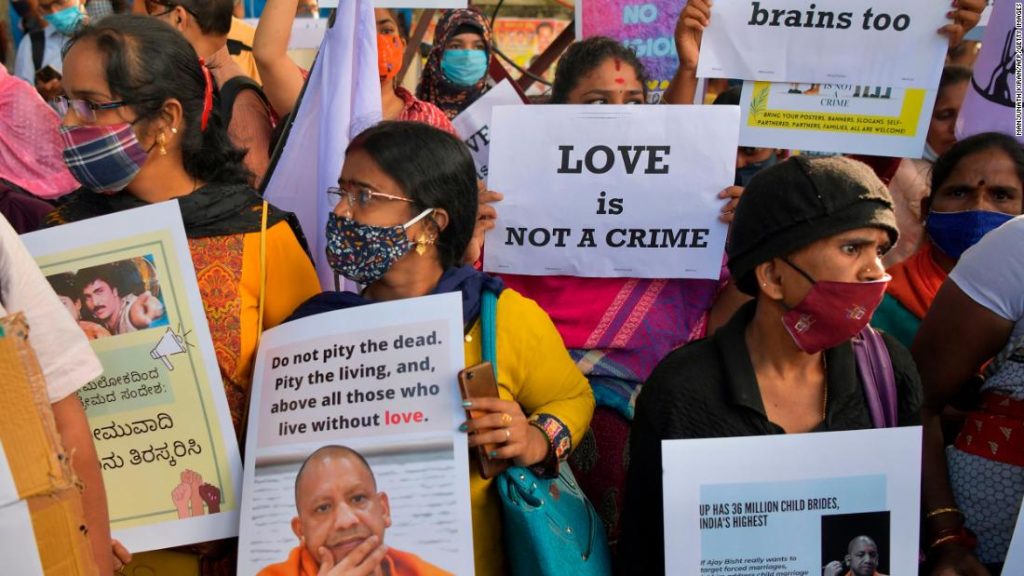All of them seek to ban something that doesn’t actually exist: “love jihad,” an Islamophobic term referring to a purported phenomenon in which Muslim men marry women of other faiths — especially Hindu women — to convert them to Islam. Some right-wing Hindus claim that this alleged “conversion” results in a threat to women’s safety, citing
tragedies like the reported murder of a Hindu woman last month by a young Muslim man as proof of “love jihad.” (In addition to murder, authorities have charged the young man with attempting to abduct the young woman to seek to compel her to marry him,
The Indian Express reported; they noted he abducted her once before, in 2018.)
In Uttar Pradesh, authorities have just brought charges under one of these laws for the first time, accusing a male college student of threatening to kidnap a young woman and of trying to force her to convert to Islam,
The Times of India reports. Despite this case, as the push for these new laws unfolded, the Hindu-nationalist BJP
had admitted in Parliament that no case of “love jihad” had ever been identified.
As troubling as it is that an ethnonationalist conspiracy theory seems to have taken hold, the motivation behind it also ignores women as individuals, painting them as naive and incapable of thinking for themselves or making their own decisions.
Since its independence, India has seen religious animosity between its Hindu and Muslim communities. Starting with its partition from Pakistan, an Islamic republic, however, India has maintained, constitutionally, that it is a secular democracy. The topic of “love jihad” was revived in the national conversation on Oct. 9
after Tanishq, a jewelry company, was accused of “glorifying” Hindu-Muslim marriages, and subsequently “love jihad,” in an ad. The ad was heavily trolled on social media, with right-wing Hindu fundamentalists
promising to “boycott” the company. Eventually, the company
pulled the ad, saying it feared for the “well being” of its employees.
Since then, BJP state leaders have chimed in, proposing laws that would ban the practice of “love jihad,” mandating government permission for recent religious converts to marry.
The government will “work to curb ‘love-jihad,'” said Uttar Pradesh Chief Minister Yogi Adityanath,
on Oct. 31, adding, “We’ll make a law.” BJP politicians in the states of Haryana, Madhya Pradesh,
Karnataka and
Assam followed suit, pushing similar proposals.
On Nov. 24, the Uttar Pradesh government cleared an ordinance to check “unlawful conversions,” saying that, in “cases of forced mass conversions,” it would enforce a jail term of three to 10 years with a penalty of up to Rs. 50,000 ($675) for mass conversions,
The Hindu reported; where women converted just for the purpose of marriage, marriages would be invalidated. “If a person wants to perform marriage after converting into any other religion, they will need to take permission from the district magistrate two months before marriage,”
said state Cabinet Minister Siddharth Nath Singh.
I cannot help but see a double standard at play here, given the real issues that surround marriage in India. Arranged marriages, which still dominate, work to ensure that i
nter-caste unions are prevented. Child marriage is illegal in India, with the marriageable age being 18, but the country has the highest total number of child brides globally,
according to the civil-society partnership Girls Not Brides. Nearly 27% of women ages 20 to 24 reported having been married before their 18th birthday,
according to a 2015-16 survey by the Indian government.
And yet, “love jihad” laws are being pushed by a government seen by some as striving toward a “Hindu rashtra,” or Hindu nation-state.
The right to marry is a part of the right to life and liberty under Article 21 of the Indian Constitution,
as affirmed by India’s Supreme Court in 2018. The right to marriage is also stated under the United Nations’
Universal Declaration on Human Rights, of which India is a signatory and which calls for a “free and full choice” in decisions on when and whom to marry.
It’s 2020, and rather than shedding our oppressive, archaic ideas about marriages based on caste, or progressing toward giving everyone — including the LGBTQIA+ community — the right to marry, we’re degenerating as a nation. This is a country in which
victim blaming is prevalent in cases of sexual violence and assault, and in which one minister now keen to pass laws on “love jihad”
alleged that conspirators were fomenting the riots that unfolded after the rape and murder in September of a 19-year-old Dalit woman.
In February this year, the BJP’s own junior home minister, G. Kishan Reddy, said in Parliament: “The term ‘love jihad’ is not defined under law. Article 25 of the Constitution provides for freedom to freely profess, practice and propagate religion subject to public order, morality and health.” And while Indians, and Indian women, can find comfort in court rulings like the
recent Allahabad High Court’s quashing of a formal complaint that accused a Muslim man of abducting and forcibly marrying a Hindu woman after converting her to Islam (the ruling categorically stated that “two adults are free to choose their partner”), this law, like others, first and foremost serves those on a quest to build a Hindu nation-state. It ignores India’s constitution.
Violent crimes against women are concerning. Yet, when we talk about “love jihad” laws, we’re not talking about women’s safety — rather, we’re talking about taking away a woman’s right to choose her spouse. We’re talking about communalizing a marriage, distilling it into the faiths of the respective parties, rather than looking at two adults as individuals.

